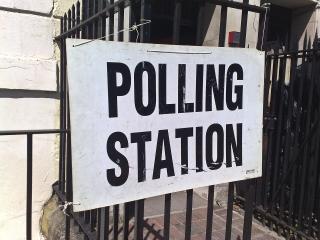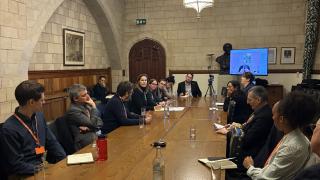
Britain goes to the polls in just over a week’s time.
At UNA-UK we believe this is a time to reiterate the UK’s responsibility to be a champion for international cooperation and the multilateral system with the UN at its centre. The challenges the UK faces at home, and the collective challenges facing the world, are inextricably linked. Increasingly acute global challenges have no regard for borders, in turn the effort to develop and implement solutions must be shared. It is only through close cooperation with the international community that the UK will tackle the major threats we face – climate change, financial instability and energy crises, the fallout from conflict and the risks of new technology – and create a positive future for the UK and the world.
Key questions for candidates:
As election day draws near, interacting with party representatives becomes even more important. By drawing attention to the connection between national and global interests, you can put questions to candidates about global issues that matter to you and remind them that the policies of a new government should reflect this. You might also prompt candidates to research and publicly state their positions on key elements on UK foreign policy and their vision for the UK’s role in the international system. This effort not only helps to elevate these issues on the agenda but also allows for holding the elected candidate accountable once they take office. Do your bit to support internationalism by asking candidates and canvassers the following questions and publicise their answers to your networks. We provide some answers to prompt candidates in their response.
- What will you do to support the United Nations and International Cooperation?
As a permanent member of the UN, the UK retains an outsized influence on the multilateral system. The next government should reflect on how the UK can harness this privileged position to positively effect global institutions, champion and expand the norms and standards they create and maintain, while also proactively ensuring the UK’s foreign policy is underpinned by values in line with human rights and international law. The government should recognise that a well-funded and functioning international system – including effective multilateral institutions capable of addressing global issues – is beneficial to its interests, both foreign and domestic.
The UK can aspire to lead, and where appropriate lead from behind, in governance and multilateral reform to support an effective UN at the forefront of addressing the many interconnected and escalating challenges facing the world. The UK's instincts and interests are distinct from both American and purely European perspectives, which positions it well to influence discussions on security and responses to Russia ,and China and the complex evolving geopolitical dynamics in Africa, Asia, and the Middle East. By acting swiftly, the UK can also play a significant role in shaping the governance of emerging technologies, including AI and in particular AI weaponry. Additionally, it should continue to lead on climate change, as the transition to renewable energy will transform global politics.
- How do you intend to ensure the UK takes a leading role in safeguarding human rights globally?
This election is a watershed moment for human rights in the UK, and world leaders will be watching closely which direction the UK takes under a new government. In recent years we have witnessed a backsliding on the UK’s commitments to international laws and standards in the form of domestic legislation on issues such as migration and policing, that have drawn consternation from UN officials and agencies. We cannot afford for the UK, an historic champion of international law, to fall short of its obligations – the UK can and must lead by example. Britain cannot challenge grave human rights abuses happening around the world if it does not uphold them at home. Human rights are not something you can cherry pick to suit your political agenda and the UK must ensure that it responds to violations of human rights and international law without fear or favour. These frameworks are the bedrock of the UN and our international rules-based order, a system that is under increasing strain as devastating conflicts intensify and climate breakdown continues at pace.
Politicians need to stop treating the issue as a political punching bag, and start seeing the tangible benefits a compassionate human rights agenda could deliver for the UK and its people: from strengthening Britain’s role on the global stage in responding to egregious violations of human rights, through to providing a framework that could protect the most vulnerable in the UK and internationally.
- What is your approach to Nuclear Disarmament and Non-proliferation?
Nuclear weapons pose the gravest threat to humanity. A single weapon has the capacity to obliterate an entire city, potentially causing millions of casualties and posing long-term catastrophic risks to the environment and future generations. The inherent danger of these weapons stems from their existence alone.
The lack of progress on disarmament by nuclear-armed states has severely eroded trust, increasing the likelihood of the disarmament process collapsing altogether. Many states and experts are now questioning the effectiveness of multilateral disarmament efforts in this challenging environment. It is imperative for the UK to rebuild trust with non-nuclear states by embracing a new approach to the Treaty on the Prohibition of Nuclear Weapons (TPNW), also known as the nuclear ban treaty. This treaty enjoys support from a majority of countries and serves as a justified response to the failure of nuclear-armed states to fulfil their legal obligation to pursue a nuclear-free world.
The UK should acknowledge the significance and validity of the TPNW in advancing global efforts toward nuclear disarmament. It should demonstrate its willingness to engage with the Treaty by participating in future meetings of states parties as an observer. Furthermore, the UK should heed the advice of UN officials, including the UN High Representative on Disarmament Affairs, to engage constructively with the TPNW rather than dismiss or undermine it. To maintain credibility, these actions must be accompanied by tangible steps from the UK to fulfil its international commitments on disarmament.
- Would you increase UK contributions to UN peacekeeping?
The UK's engagement in UN peacekeeping involves three main facets: its role on the Security Council in shaping peacekeeping mandates, financial contributions to operations, and the deployment of troops.
Within the Security Council, the UK assumes a pivotal role, particularly in drafting resolutions pertaining to peacekeeping, the protection of civilians, the Women, Peace and Security Agenda, and specific country situations such as Somalia, Darfur, and Cyprus. Beyond its influential role in decision-making, the UK is a significant financial supporter of UN peacekeeping efforts. As the fifth largest contributor, the UK allocates 6.68% of the UN's total budget for peacekeeping operations.
However, when it comes to troop contributions, the UK's engagement is relatively modest. Currently, the UK deploys 286 troops, predominantly in Cyprus—a mission known for its stability and longevity. Notably, only 18 of these troops are women. This places the UK in the 50th position among peacekeeping contributors. Comparatively smaller nations like Fiji contribute more than double the personnel, while China, another permanent Security Council member, provides 2,183 personnel. While the UK will make the case that it compensates for this absence with other forms of support, Troop Contributing Countries strongly feel that a sharing of burdens that does not include the sharing of risks leads to a damaging divide between those that lead and those that bleed.
UNA-UK's Peacekeeping Programme advocates for greater UK involvement in UN peacekeeping, leveraging the UK's substantial military personnel, equipment, and expertise following the withdrawal of the UK contingent and subsequent dissolution of the UN Mission in Mali MINUSMA. This initiative aligns with the UK's longstanding commitment to humanitarian efforts. UN Peacekeeping has had a tough time as states turn away from them and towards private mercenaries who are far less likely to uphold human rights standards. This is very alarming for the world's most vulnerable, and for the UK's security interests in some of the most unstable parts of the world. As the UN prepares to review the role of peacekeeping missions and its peace and security architecture, the UK needs to invest in the system in order to be able to shape the conversation about its future
- Do you fully support the UK’s commitment to reaching net zero by 2050 and to meeting the target for 2030 announced at COP26 in Glasgow in 2021?
As we witness distressing scenes of people fleeing wildfires close to home, countless lives and livelihoods worldwide are being devastated by the impacts of extreme heat and climate change. There is an urgent need for the next government to move beyond short-sighted policymaking and intensify efforts towards a fair and sustainable transition, while investing in renewable energy and green jobs. The decision to expand oil and gas exploration directly contradicts the goal of achieving Net Zero emissions by 2050—a target the UK is already struggling to meet. Increasing reliance on fossil fuels is also a serious misstep that undermines the UK's ability to confront aggressors and human rights violators, a lesson that should have been learned from Russia's unlawful actions in Ukraine.
What the parties have said
The prosperity and security of Britain are influenced by factors that we cannot manage in isolation. Consequently, global issues must be a significant consideration in any decision regarding Britain's future. In the countdown to the General Election 2024, UNA-UK is highlighting sections from each party’s manifesto on international cooperation, as well as on the key areas of UNA-UK’s policy and campaign priorities to create a ‘manifesto comparison document’ and a summing up statement.
Understanding the manifesto comparison document
When reviewing the results, please remember the following:
- The text included comprises verbatim extracts from political parties' 2024 General Election manifestos.
- We have attempted to analyse every political party that had MPs in the most recent dissolved parliament.
- Manifestos are ordered by number of MPs at dissolution. Where numbers are tied, alphabetical order was used. The Cooperative Party has been listed last given that its MPs are also jointly Labour MPs and as such there were no exclusively Cooperative Party MPs
- We will be adding to the manifesto comparison document as the parties’ manifestos are published.
- Different parties approach manifestos differently; some will be more detailed and discursive; others prefer to keep it simple.
- Manifestos are not the only policy expression by political parties - the absence of information on a particular issue could be caused by a number of reasons and may not indicate the absence of a policy on this issue.
- Given that responsibility for British foreign policy lies with the Westminster government, some parties based in devolved nations may choose not to include commitments on foreign policy.
- While we aim to be as thorough as possible, we may have missed something so please do not take this as a definitive round-up of policies.
- For definitive information, please read the manifestos directly (see links below).
- Reform UK called its policy document a "contract" rather than a manifesto and describe it as a ‘working draft’.
- While we followed the same methodology for each manifesto, categorisation into comparable themes will always require discretion and arguably relevant content may be missed.
- UNA-UK is a UK registered charity and is not affiliated with any political party.
Click here to read our analysis: General Election 2024: Putting a foreign policy lens on party manifestos
Links to manifestos
- Conservative Party Manifesto
- Labour Party Manifesto
- Scottish National Party Manifesto
- Liberal Democrats Manifesto
- Democratic Unionist Party Manifesto
- Sinn Féin Manifesto
- Plaid Cymru Manifesto
- Alba Party Manifesto
- Social Democratic and Labour Party (awaiting publication)
- Alliance Party Manifesto
- Green Party Manifesto
- Reform Contract
- Workers Party Manifesto
- Co-operative Party manifesto (awaiting publication)
Photo: Polling station sign, London. UK general election (and local council elections), 6 May 2010. Source.






